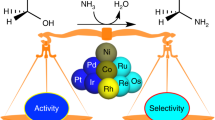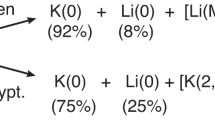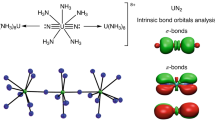Abstract
RECENT observations1 on exchange reactions between heavy water and cobaltammines suggest a possible mechanism for certain reactions of the latter.
This is a preview of subscription content, access via your institution
Access options
Subscribe to this journal
Receive 51 print issues and online access
$199.00 per year
only $3.90 per issue
Buy this article
- Purchase on Springer Link
- Instant access to full article PDF
Prices may be subject to local taxes which are calculated during checkout
Similar content being viewed by others
References
Erlenmeyer and Gartner, Helv. chim. Acta, 17, 1008 (1934); James, Anderson and Briscoe, NATURE, 139, 109 (1937).
Brønsted and Volquhartz, Z. phys. Chem., 134, 97 (1927).
Brønsted and Livingstone, J. Amer. Chem. Soc., 49, 435 (1927).
Brønsted, Z. phys. Chem., 122, 383 (1926).
Author information
Authors and Affiliations
Rights and permissions
About this article
Cite this article
GARRICK, F. A Possible Acid-Dissociation of Metal-Ammonia Ions, and its Bearing on Certain Reactions. Nature 139, 507–508 (1937). https://doi.org/10.1038/139507b0
Issue Date:
DOI: https://doi.org/10.1038/139507b0
Comments
By submitting a comment you agree to abide by our Terms and Community Guidelines. If you find something abusive or that does not comply with our terms or guidelines please flag it as inappropriate.



